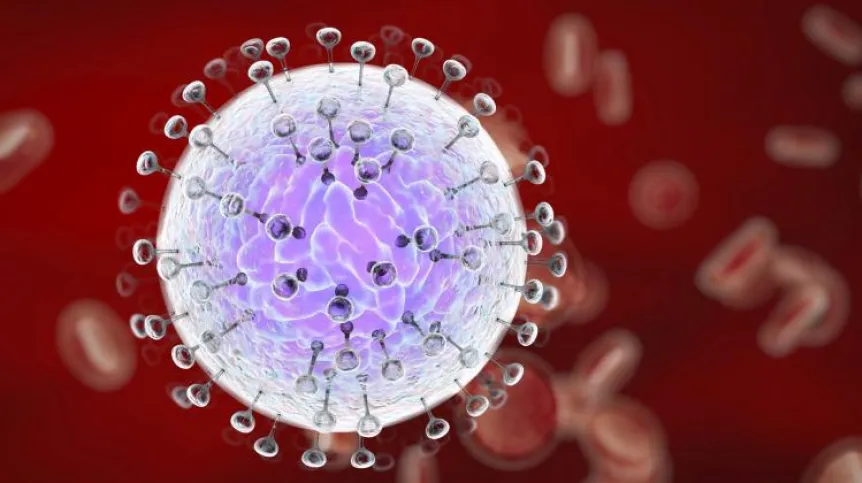
Zika, dengue, yellow fever and Japanese encephalitis viruses belong to one genus - flavivirus. Dr. Ewelina Król, who is working on the vaccine against the Zika virus, talks about the development of vaccines for diseases caused by this group of pathogens.
Flavivirus is a genus that includes harmful viruses: Zika, dengue, yellow fever, West Nile and tick-borne encephalitis. These pathogens are transmitted to people, for example, by mosquitoes or ticks. Various flaviviruses - as it often happens in the family - are quite similar to each other and appear in similar regions. And that is a problem. It not only makes diagnosis difficult (similar viruses can be misdiagnosed), it is also a barrier to the production of new vaccines. The team from the Intercollegiate Faculty of Biotechnology of the University of Gdańsk and the Medical University of Gdańsk draws attention to this problem in the publication in Trends in Biotechnology (https://doi.org/10.1016/j.tibtech.2019.03.013).
Dr. Ewelina Król`s team is working on vaccines against the Zika virus and tick-borne encephalitis. The researcher explains the trends in research on new flavivirus vaccines in an interview with PAP.
Vaccination consists in providing the body with a safe stimulus, which forces the body to produce antibodies to fight the infection. The idea is to help the body learn to recognize and fight pathogens in safe conditions. Thanks to this, if an infection happens in the future, the body will already have a prepared "arsenal" to fight the pathogen.
VIRUS OR PROTEIN?
According to Dr. Król, there are two important directions in the approach to work on new flavivirus vaccines. One approach is to create vaccines based on either inactivated or attenuated viruses. Inactivated viruses are viruses that have been exposed to deadly agents (such as temperature or chemical compounds). In turn, attenuated viruses are selected virus strains, weakened or modified so that they are not able to multiply in the body and threaten human health. Attenuated viruses are already used in yellow fever and dengue vaccines, and inactivated ones in tick-borne encephalitis and Japanese encephalitis vaccines.
The second approach consists in introducing not the whole viruses into the body, but only proteins that are typical for given viruses. These proteins can be produced in vitro, for example by insect, protozoan or yeast cells.
The latter approach appeals more to Dr. Król`s team. In their work, researchers from Gdańsk produce so-called virus-like particles (VLP). They are protein capsules - virus "packaging" that does not contain the genetic material of the pathogen. The researcher says that flavivirus vaccines based on VLP are not available yet. But vaccines with such virus-like particles are already used to fight other viral diseases: Hepatitis B or HPV.
But there is a race all over the world: who will be the first to produce a VLP-based vaccine against Zika virus.
ONE FOR ALL, ALL FOR ONE
"If we know how to produce VLP-based vaccines based on VLP against Zika virus, we will probably be a step closer to vaccines against other flaviviruses - for example, the dengue virus" - says Dr. Król.
The virologist notes that Zika and dengue viruses are very similar to each other. For example, in diagnostics, a history of Zika infection is easily confused with infection with the dengue virus.
"If, for example, you test for antibodies indicating a history of dengue infection in someone`s blood, you will not be sure if that person has been infected with dengue or Zika virus, or even both" - sums up Dr. Król. She adds that the first symptoms of both these flavivirus diseases are usually quite similar: fever, pain in the joints and muscles.
DENGUE VACCINE IN RETREAT
This similarity between the Zika and denga viruses was also the reason why the dengue vaccine (introduced in 2016) was withdrawn in several countries. It turned out that people vaccinated for this disease were more likely to suffer a more severe infection with the Zika virus.
This reaction to the vaccine is related to the atypical course of dengue. Once a disease has passed, it protects against repeated infection with exactly the same type of virus. However, if the person is attacked by another type of dengue virus, the disease is often severe and there is a high risk of complications (antibody-dependent enhancement).
According to Dr. Król, a similar problem applies to the current dengue vaccine. After administration of the vaccine, the body produces antibodies that can increase the intensity of infection with another flavivirus. "That`s why patients who had had dengue or had been vaccinated against it, had greater complications if they were subsequently infected with another type of dengue virus or Zika virus. Because of this risk of complications, the dengue vaccine was withdrawn in many countries" - says Dr. Król.
Currently, after many years of clinical trials, in accordance with the latest guidelines, the dengue vaccine is recommended only for people who have already had dengue.
ANTIBODIES READY FOR ONE WAR ONLY
In the development of new vaccines, researchers must pay attention to the similarities between various flaviviruses. And investigate whether the antibodies that the body will produce as a result of administering the vaccine will not cause complications if the patient is infected with other flaviviruses. This also applies to the research conducted by Dr. Król. "The idea is to produce virus-like particles that, if administered in a vaccine, would trigger the production of only those type of antibodies that will not react to another flavivirus infection. Unfortunately, this requires a lot of research" - the researcher concludes.
PAP - Science in Poland, Ludwika Tomala
lt/ ekr/ kap/
tr. RL













